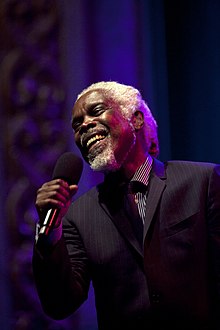Billy Ocean | |
|---|---|
 Ocean performing at the State Theatre in Sydney, Australia, 2012 | |
| Background information | |
| Birth name | Leslie Sebastian Charles |
| Born | 21 January 1950 Fyzabad, Trinidad and Tobago, British West Indies |
| Origin | Romford, East London, England |
| Genres | |
| Occupations |
|
| Years active | 1969–present |
| Labels | |
| Spouse | Judy Charles |
| Website | billyocean |
Leslie Sebastian Charles MBE (born 21 January 1950), known professionally as Billy Ocean, is a Trinidadian-born British singer and songwriter. Between 1976 and 1988, he had a series of hit songs in the UK and internationally.
After releasing several recordings under other stage names, he achieved breakthrough success with the 1976 single "Love Really Hurts Without You". It was the second single released under the stage name Billy Ocean and peaked at no. 2 in the UK and no. 3 in Australia. Later that year, he achieved two additional top 20 singles in the UK. In 1977, his single "Red Light Spells Danger" also peaked at no. 2. After a period of limited chart success, he released the single "Caribbean Queen (No More Love on the Run)" in 1984. In the UK, the song peaked at no. 6. In the U.S., it entered the Billboard Hot 100 at no. 85 but peaked at no. 1 ten weeks later. Ocean won the 1985 Grammy Award for Best Male R&B Vocal Performance for the song. It also charted in Australia, Canada, Ireland, New Zealand, South Africa and across Europe under three different titles. Across the next three years, Ocean accumulated a series of international hit singles. Released in 1985, "When the Going Gets Tough, the Tough Get Going" peaked at no. 1 in the UK and no. 2 in the U.S. the following year. In the same year, he achieved an American no. 1 with the single "There'll Be Sad Songs (To Make You Cry)". In 1988, his single "Get Outta My Dreams, Get into My Car" reached no. 1 in the U.S. and no. 3 in the UK.
In recognition of his success and influence, Ocean has received a number of awards. In 2002, he was presented with an honorary doctorate of music by the University of Westminster. In 2010, he received a Lifetime Achievement Award at the MOBO Awards. The following year, he became a Companion of the Liverpool Institute for Performing Arts.[1]
- ^ "Billy Ocean will be named a LIPA companion by Paul McCartney this afternoon". Liverpool Daily Post. Retrieved 19 September 2014.